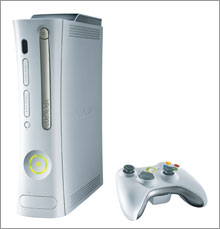 |

| Prepare to die. Over and over and over.
|
|
|
|
|
|
|
NEW YORK (Business 2.0) -
For Microsoft, this week's launch of the Xbox 360 is the biggest thing since Windows 95. For the man leading the charge, it's also a chance for revenge against Sony's PlayStation mastermind.
Peter Moore relishes the moment he bumped into Ken Kutaragi at the Tokyo Games show in September. Moore is the top marketing executive for Microsoft's new videogame console, the Xbox 360; Kutaragi, the legendary Sony PlayStation CEO, is his archnemesis.
Kutaragi invited Moore to the Sony booth "to check out the PlayStation 3 videos." The PlayStation 3 is not due until April, and all Sony had to demo in Tokyo were noninteractive computer graphics. The Xbox 360, which launches in the United States this week, did not have the same problem. "Thank you, Ken," Moore said with a grin. "Come by our booth if you want to play actual videogames."
It might make for a good trade-show zinger, but Microsoft's first-mover strategy in this latest round of console combat is risky. No one knows that better than Moore, who helped launch an acclaimed game system six years ago -- only to see it crushed by the PlayStation 2, which now commands a 60 percent share of the $25 billion global market.
If any company has the muscle to challenge that dominance, it is Microsoft. Having gained a strong market footing for the first Xbox, at a cost of $4 billion in losses, Bill Gates and Steve Ballmer are doubling down their bets on its successor. And they've tapped Moore to spearhead a marketing campaign costing at least $50 million. The goal: Outflank Kutaragi by finding a mainstream audience even PlayStation couldn't reach.
The stakes are enormous. If Moore's attack makes significant inroads into PlayStation's market share, he will have almost single-handedly realized Gates's vision of Microsoft as a home entertainment powerhouse. But if Kutaragi has the last laugh, Microsoft may have an even greater battle on its hands. Kutaragi expects the PlayStation to one day replace the PC. "For Peter," says Xbox executive J. Allard, "this time it's personal."
Dreamcasted
Moore, the son of pub owners from Liverpool, England, is a former marketing VP for Reebok. In 1999 the Japanese game publisher Sega hired him to broaden the appeal of its Dreamcast console -- seven months before it was due to launch in the United States. Moore went to work forging marketing partnerships with companies like MTV. The Dreamcast failed to gain steam in Japan, but its U.S. launch was spectacular, with 1.8 million units sold in the first four months.
Then in 2000, Kutaragi started hyping what he called the "emotion engine," the microprocessor in PlayStation 2. It worked: The PS2 became an object of desire, and Dreamcast's momentum ground to a halt. Sega pulled the plug on Dreamcast in January 2001. It would become a company that made nothing but games -- mostly for the PS2. Moore agreed but had to fire 52 employees, many of whom he had personally recruited from Reebok. "Dreamcasted" became a verb in videogame circles.
Moore joined the Xbox team in January 2003. He was courted by Microsoft CEO Ballmer, who was frustrated that Xbox hadn't gained more ground. (It had at that time stalled at a 23 percent market share in the United States.) Sony, Ballmer realized, was simply better at marketing.
What Moore did at Sega "took guts," says Ballmer. "I love that." Moore couldn't resist a rematch with Kutaragi -- this time with Gates's checkbook in his pocket.
As soon as Moore came to Redmond, he started asking employees: Why wouldn't I want to buy a PlayStation 3?" The big problem at Microsoft is that they always tell you why you need something," he says. "For the Xbox 360, you need to feel like you want it."
Moore has banned technology from Xbox 360 commercials. Instead, the campaign is supposed to evoke childhood memories of playing with friends. "The idea is, if you aren't involved you're missing something," he says. To be cool, in other words, you have to be part of the Xbox gang.
The real danger is that the Xbox 360 won't make enough of an impact in the crucial window before the PS3 launches. Sony caught Microsoft off balance already, at the E3 trade show this year in Los Angeles. Hours before the Xbox 360 press conference, Kutaragi announced a PS3 whose specifications were more powerful than anyone had expected.
"Sony showed everyone why they are on top," says Ubisoft president Laurent Detoc.
Moore is undaunted. "We are not going to be Dreamcasted," he insisted in a rousing speech to Xbox employees. "I will not let that happen again."
He points to Sony's corporate struggles: In September, CEO Howard Stringer announced he would lay off 10,000 employees. The parent company's woes may affect Kutaragi's ability to launch the PS3 at a reasonable price.
If he does win the battle against Kutaragi, Moore knows that his war will be about more than videogames. Ballmer doesn't rule out the idea of the Xbox team creating a digital-music player. There's already talk that Moore could head up Microsoft's broader entertainment strategy. First Ken Kutaragi, then Steve Jobs?
Read the full story on Business2.com.
More from Business 2.0:

|